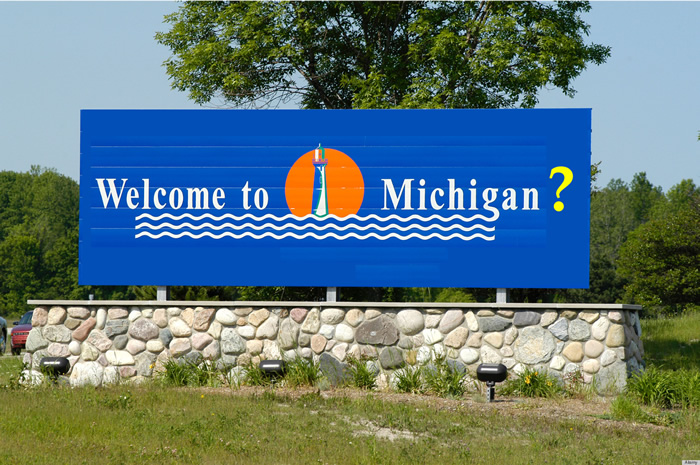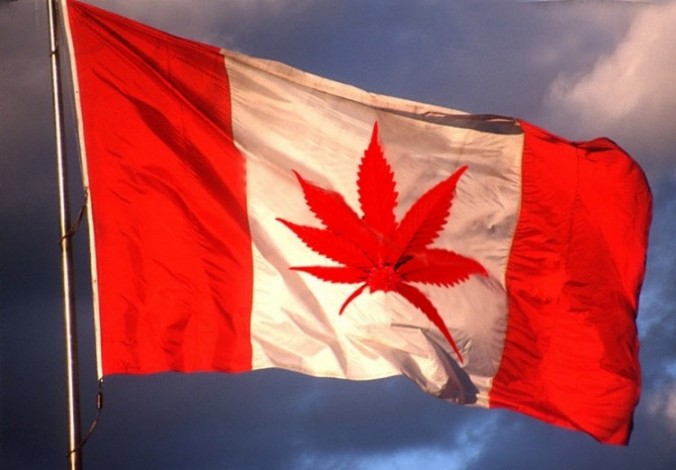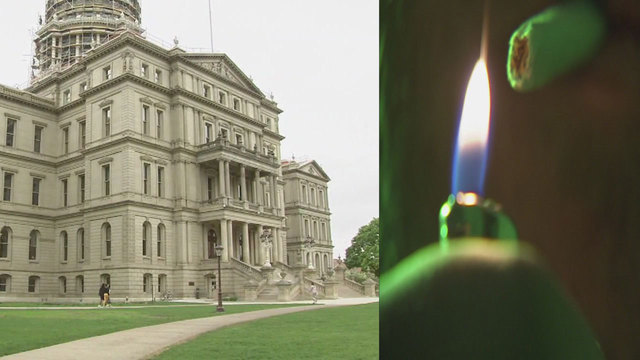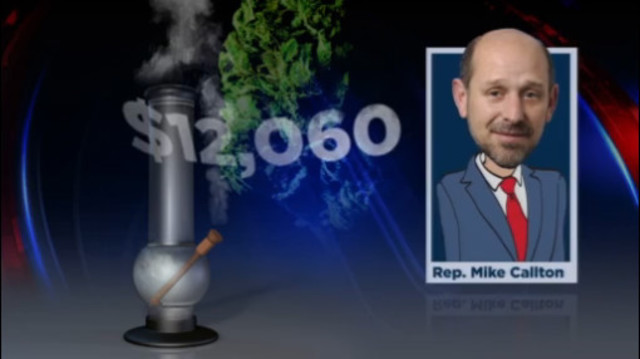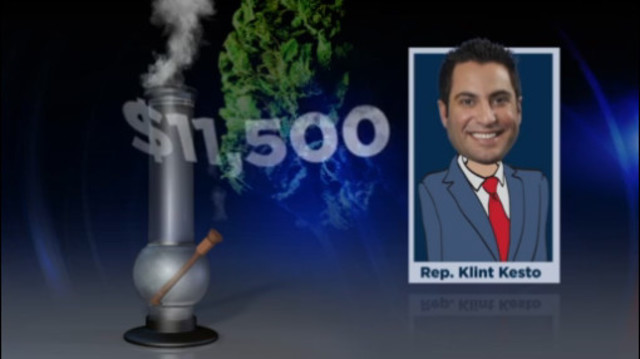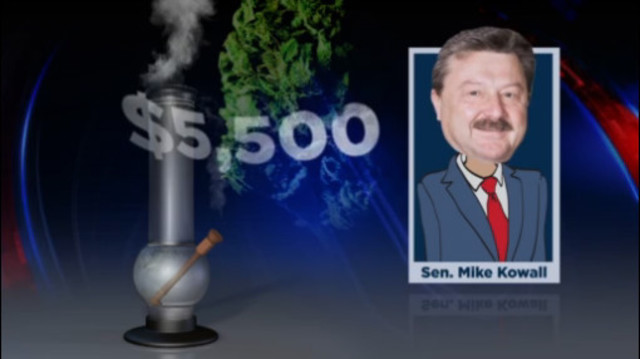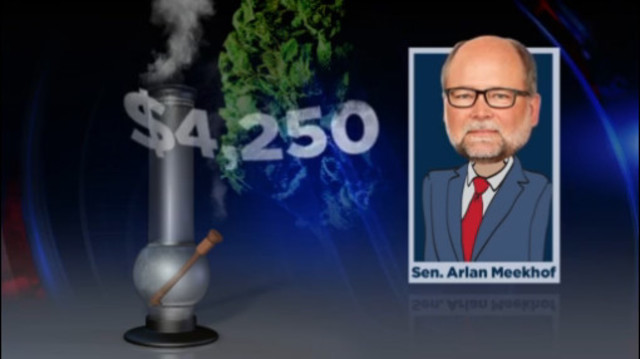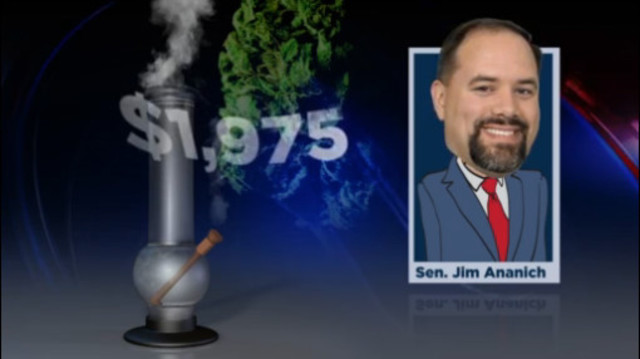
Jun 30, 2016 | Blog, Criminal Defense Attorney Michael Komorn, Medical Marijuana Attorney Michael Komorn, News
A Southfield lawyer alleges the Michigan State Police crime labs have “falsified lab reports on marijuana statewide” and he’s asking a judge to dismisses charges lodged against a client.
Michael Komorn, who also represents defendants in Livingston County, said his office’s discovery stems from Ottawa County resident Maxwell Lorincz, who was initially charged with a misdemeanor possession of marijuana. The Ottawa County prosecutor’s office increased the charge to a felony when Lorincz declined to plead guilty, Komorn said.
“The extensive emails and documents we received through the Freedom of Information Act show the prosecution are relying on the lab to report these substances so that they can escalate these crimes from misdemeanors to felonies,” the defense attorney said.
Tiffany Brown, a spokeswoman with the state police, said the crime lab’s role is to “determine whether marijuana or THC are present in a sample.
” The department’s policy changed to include the statement “origin unknown,” she noted, “when it is not possible to determine if THC originates from a (marijuana) plant or synthetic means.”
“This change makes it clear that the source of the THC should not be assumed from the lab results,” Brown said in an email response to an inquiry for comment. “The ultimate decision on what to charge an individual with is determined by the prosecutor.”
A message to Karen Miedema, an assistant prosecutor with Ottawa County, was not immediately returned Wednesday.
As a result, Komorn is asking a judge to dismiss the case against Lorincz and to hold the parties, including the prosecutor, in contempt of court. The hearing was scheduled for next week in Ottawa County Circuit Court in Grand Haven; however, it was put on hold until December following a conference between prosecutors, the defense and the judge.
Komorn’s client was first charged with misdemeanor possession of marijuana, but the charge was increased to a felony alleging he had synthetic THC.
The charge resulted when an officer reporting seeing a small amount of hash oil in Lorincz’s Spring Lake home when he responded to his 911 call for medical assistance for his wife in September 2014.
Komorn says the state police’s policy change began in 2013 when Ken Stecker of the Prosecuting Attorneys Association of Michigan and state attorney general’s office “instructed the lab” it could report marijuana edibles and oils as Schedule 1 synthetic THC, which is a felony.
“This was counter to both law and science as plant-based edibles and oils are categorized as marijuana under Michigan law and their possession punished as a misdemeanor,” Komorn said.
Komorn’s office used FOIA to obtain numerous emails regarding the issue. Among those emails was one from Kyle Hoskins, a state police crime lab supervisor who said examiners needed to see plant material because they would have no idea how it was produced unless they watched its production.
He sought Stecker’s opinion, who reportedly responded: “That is my opinion, THC is a Schedule 1 drug regardless of where it comes from. I hope that helps. Ken.”
Marijuana is a Schedule 2 drug under state law.
Among the emails Komorn received were some from state police crime lab workers raising concern about the way they were told to report THC cases.
In one email, a forensic scientist notes that to “place the actual compound THC in Schedule 1 (drugs), the criteria of ‘synthetic equivalent’ should be met.”
“Since we really can’t do this, there are many of us who feel that these new evidentiary materials containing THC without any botanical morphology characteristics … should be identified as resinous extracts of marijuana,” the forensic scientist wrote.
The writer goes on to note that misdemeanors can jump to a felony charge and the topic is being brought up “because there seemed to be some concern about uniformity in making these calls. Further, it is highly doubtful that any of these (medical marijuana) products we are seeing have THC that was synthesized.”
Komorn’s office said the “statewide lab scandal” comes on the heels of a report that statewide marijuana arrests are on the rise.
Between 2008 — when Michigan passed the Medical Marijuana Act — and 2014, arrests for marijuana possession or use increased 17 percent statewide while arrests for all crimes dropped by 15 percent, according to statistics.
Charmie Gholson, founder of Michigan Moms United, said Komorn’s case clearly shows that Michigan’s top prosecutors and law enforcers “conspired to commit crimes against Michigan families.”
“There’s a strategy,” she said. “Someone at the top has sent these soldiers to people’s homes. … This proves the top law enforcement has conspired to target families.”
Lorincz Daubert Exhibits
Contact Livingston Daily justice reporter Lisa Roose-Church at 517-552-2846 or lrchurch@gannett.com. Follow her on Twitter @LisaRooseChurch.
November 4, 2015

Apr 21, 2016 | Legalization, News
Canada to introduce legislation in 2017 to legalize marijuana
OTTAWA — The Canadian government announced Wednesday that it will introduce legislation next year to decriminalize and legalize the sale of marijuana, making Canada the first G7 country to permit widespread use of the substance.
The announcement was made by Canada’s health minister, Jane Philpott, at a U.N. drug conference in New York. It follows through on a promise made during Prime Minister Justin Trudeau’s successful election campaign last fall.
Philpott said details of the legislation are being worked out, but she vowed that the government “will keep marijuana out of the hands of children and profits out of the hands of criminals.”
With the Liberals holding a majority in the House of Commons, the marijuana legislation is likely to pass. The path toward the legalization of marijuana is the latest in a string of policy announcements from the 44-year-old Trudeau that have moved Canada to the left after a decade of Conservative Party rule, including last week’s unveiling of legislation to permit assisted suicide.
Trudeau, whose new government remains extremely popular, has long been associated with the marijuana legalization issue. While an opposition party member in Parliament, Trudeau admitted to occasional use of marijuana. “I think it’s five or six times that I’ve taken a puff. It’s not my thing,” he told reporters at the time.
The Conservative Party attempted to use that statement as proof that Trudeau was a political lightweight and a pothead. In the 2015 election, the Conservatives ran ads in ethnic newspapers falsely alleging that Trudeau backed the sale of marijuana to children.
The attack ads failed, in part because most Canadians no longer see the legalization of marijuana as a problem. A recent survey by Nanos Research, an Ottawa public opinion firm, showed that 68 percent of Canadians “support” or “somewhat support” legalizing marijuana and only 30 percent are opposed.
The population is more divided when it comes to allowing Canadians to grow marijuana at home, and about 50 percent of respondents said that they expect legalization to lead to more usage by those younger than 21.
Unlike in the United States, where marijuana regulation is shared by the states and the federal government, in Canada the issue falls almost solely under federal jurisdiction. Marijuana use has been expanding since a court ruling in 2000 allowed Canadians to possess and grow small amounts for medicinal reasons.
Full legalization will make pot available in a way similar to alcohol. That could encourage Americans, particularly those in border areas, to pop over for a puff or two.
Already, Ontario’s provincial premier, Kathleen Wynne, has volunteered that the provincially owned liquor monopoly would be happy to sell the drug. Canada’s major drugstore chains have said that they would like to get in on the business, too.
After several court rulings, commercial marijuana operations have sprouted across the country. Although currently limited to medicinal sales, the companies have been keenly anticipating legalization allowing for widespread use.
One study by a leading Canadian bank estimated that legalization could spark development of an annual marijuana trade worth about $10 billion Canadian (about $8 billion U.S.).
Brendan Kennedy, president of Privateer Holdings of Seattle, welcomed the Canadian announcement. His company owns Tilray, a medicinal marijuana facility in British Columbia, and he is looking to build a facility that would supply the market for recreational marijuana in Canada.
“The eyes of the world are on Canada as the medical marijuana program matures and the recreational program is being implemented,” he said in an interview. “Canada will be the first G7 country to have a national recreational program different from Alaska, Colorado, Oregon and Washington,” where state laws allowing marijuana use still bump up against U.S. federal prohibition.
There is still a series of negotiations required between the national government and the provinces to figure out regulation, taxation and distribution. Trudeau’s point man on the issue is Bill Blair, a former Toronto police chief.
Blair said marijuana should be treated like such intoxicants as alcohol. “We control who it’s sold to, when it’s sold and how it’s used. And organized crime doesn’t have the opportunity to profit from it.”

Original Post By Alan Freeman April 20 at 4:03 PM
https://www.washingtonpost.com/world/the_americas/canada-to-introduce-legislation-in-2017-to-legalize-sale-of-marijuana/2016/04/20/85d375a0-0715-11e6-bfed-ef65dff5970d_story.html

Apr 10, 2016 | Blog, Legalization, Michigan Medical Marijuana Act
Michigan’s medical marijuana law is a mess and dispensaries are popping up like, well, weeds and patients, police and politicians say something needs to change.
For the second year in a row, lawmakers are promising action in the meantime, FOX 2 found that their campaign accounts have reached new highs.
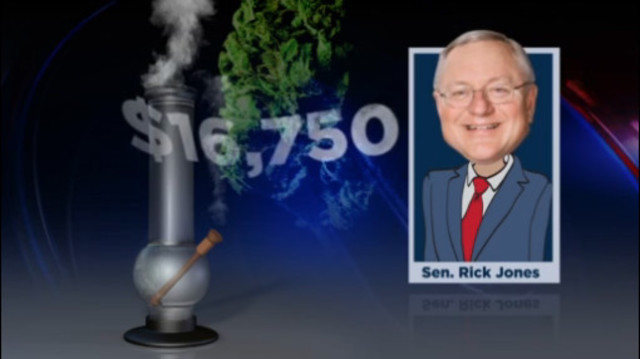





Local News
State lawmakers are finally poised to fix problems with Michigan’s medical marijuana law. It’s a worthy goal, one that that has proven very lucrative.
In fact, their efforts to help patients get better pot, has helped the politicians raise quite a lot.
M.L. Elrick: “How nice do you think it would be for the people of Michigan to say, ‘Here’s a guy who’s not going to take money because he thinks it’s might create at least the appearance of a conflict of interest?'”
Sen. Rick Jones (R-Grand Ledge): “Well … ”
That’s Rick Jones, chairman of Senate Judiciary Committee. Any effort to reform Michigan’s medical marijuana law will need Jones’ blessing.
Jones: “There’s probably a thousand factions out there.”
And many of them have given Jones’ campaign fund or his political action committee a big, fat check.
Jones: “I don’t choose who they donate to.”
That’s because lawmakers are trying to fix problems caused by the 2008 state referendum that made marijuana legal for medicinal purposes only, of course.
Voters approved using cannabis to treat the ill or aching, but questions have cropped up about the legality of matters like dispensaries and marijuana edibles and oils.
The state supreme court has weighed in on some matters, but law enforcement, law makers – and even law breakers – still have plenty of questions.
Key players in the reform efforts are the chairmen of the house and senate judiciary committees.
“What we have right now in Michigan is basically the wild, wild, west,” Jones said.
“We need to have some sort of structure for patient safety,” said Rep. Klint Kesto (R-Commerce) “For consumer safety, if it becomes legal, for a structure so that cities, townships, villages, counties are able to understand where the product is, where it’s going for taxation purposes, in order to provide the services that come after.”
“What this will do is license growers, it’ll license people who transport the product and it will license dispensaries,” Jones said. “People will know what they’re getting. It will be tested for all the bad things like the mold and the bug spray and all that to make sure that people aren’t getting that.
“Treating it more like a medicine I think is important.”
So in one of the ironies that is commonplace in the Capitol, Kesto, who is a former prosecutor, and Jones, a former sheriff, are spending a lot of time hanging out with people who make a living selling weed.
“It’s the American way of politics,” said Rich Robinson.
Still, even the cops say something must be done. Of course, no good deed goes unrewarded in Lansing.
And Kesto and Jones have collected plenty of campaign cash from folks who want to grow grass.
“It’s not surprising at all that the money’s coming out now,” said Robinson: “It’s directed with a purpose. It sure isn’t random.”
Robinson, of the Michigan Campaign Finance Network, has tracked the flow of dough in Lansing for years. He says lawmakers are experts at turning controversy into campaign checks.
“In the way this plays out, Sen. Jones will certainly consider the point of view of the interest group,” Robinson said. “But it’s ‘Step into the milking barn first before we have this conversation.'”
Campaign accounts for key Republican lawmakers have been getting fat with checks from all the folks with a stake in medical marijuana reform.
Jones leads the judiciary committee that is weighing potential changes to the rules. He recently raked in more than $16,000.
Rep. Mike Callton (R-Nashville) led an early house effort to change the law. Since then, he’s collected more than $12,000.
Rep. Kesto has also been a leader on the issue. he’s snagged more than $11,000.
As Senate Majority Floor Leader, Mike Kowall draws a lot of water. And he’s cashed checks worth more than $5,000.
Senate Majority Leader Arlan Meekhof knows how to count votes, too. And the amount sent to his political fund is at more than $4,000.
Democrats have received a little dough, too. Senate Democratic Floor Leader Jim Ananich has collected nearly $2,000.
Overall, Republicans have raised more than $55,000.
Robinson: “That’s real money, that’s real money.”
Kesto has also collected some criticism. George Brikho owns a hydroponics store and claims Kesto’s real goal is to create a lucrative carve out within the marijuana industry that will benefit the Boji family. Kesto disagrees.
“As we set up a framework, people get a little jittery,” Kesto said. “They get scared about the future, and the model changing. And I don’t know what his issue is. But it sounds like it’s more than just the business. He may need some medicine.”
The Bojis cast a shadow over Lansing, and not just from the landmark tower they own across from the Capitol.
Ron Boji recently held a high-end fundraiser for Senate Majority Leader Mike Kowal at his palatial home. Even Gov. Rick Snyder passed through.
Kesto’s political accounts don’t show any recent contributions from Boji. but FOX 2 spied him huddling with Terrance Mansour of the Michigan Cannabis Development Association and a couple other fellows with strong opinions about medical marijuana reform.
Elrick: “Nobody has a leg up with you?” Kesto: “With me? No. I look out for the people of the state of Michigan.”
Sen. Jones also says the only influence he will come under, is what’s best for the good people of the great state of Michigan.
“You will never find, not once, somebody who bought me or bought a vote,” Jones said. “I’m the only guy in town that said ‘no’ to Matty Moroun.”
But there’s no denying that medical marijuana reform has been very good for Jones’ political action committee.
“Jones’ leadership PAC has really been moribund for years,” Robinson said. “And it certainly came to life in the last few months.”
The $14,000 that Jones’ PAC raised in the most recent filing period, is by far the most it has collected in a single reporting period since Jones founded it more than nine years ago.
Much, if not all, of that money came from folks with an interest in the medical marijuana reform legislation that just happens to be resting in the hands of Jones’ Senate Judiciary Committee.
Elrick: “How nice do you think it would be for the people of Michigan to say, ‘Here’s a guy who’s not going to take money because he thinks it’s might create at least the appearance of a conflict of interest?'”
“Well, I would have them look at any other legislator in town and they raise a lot more money than I do,” Jones said. “Some of them a great deal of money. And I don’t.”
Jones’ new-found fundraising prowess comes at a curious time. He is serving his last term in the Senate. Term limits mean his State House career ends in 2018.
Elrick: “Why continue to raise money? If there’s one guy in Michigan who could say: ‘I’m not even going to let people think I’m being influenced by you, it’s me, because I’m done.'”
“Every senator, every representative raises for their caucus,” Jones said. “Typically we’re asked to contribute $7,000 a year to the caucus, Republican or Democrat, either one, to assist with the re-election of other people. so that’s one reason to raise.
“The other reason to raise is that I can take care of the charities, whether it be veterans or children’s groups or hospice or Special Olympics. I can take care of those groups in my community.”
While it took in $14,000 this fall, Jones’ political action committee only cut two checks – one for $200 to the Michigan State University College Republicans and one for $100 to the friends of Sean Bertolino.
Elrick: “So the money that you’re raising now isn’t for your next campaign?”
“Never say never, I haven’t decided,” Jones said. “And I could transfer that. Say I were to run for governor, could I transfer that for a governor’s campaign? Yes, I could.”
Elrick: “And some of the money that you might use for higher office you’re getting it from people who might be spending it, so they can get higher themselves.”
“No,” Jones said. “No.”
Campaign accounts open to public inspection are not the only places lawmakers are loading up on loot. Jones and Kesto are like many politicians in Lansing and have non-profit accounts that don’t have to report where they get their money – or how they spend it.
Jones said that his non-profit has collected $5,000 from marijuana reformers and Kesto says he has only collected a couple thousand.
When it comes to contributors, Jones says nobody has influenced his vote. He says he has invited these people to fundraisers and if they chose to come and make a contribution that was their decision.
If marijuana gets legalized by voters, the reform efforts: Two separate movements: The Michigan Cannabis Coalition and MI Legalize who want to legalize recreational use of marijuana. They are now collecting signatures and they have to collect hundreds of thousands of signatures. That would go on the ballot in November, 2016 .
Watch The Report

Apr 5, 2016 | Legalization, News
DOWNTOWN PUBLICATIONS – BIRMINGHAM
By Katie Deska News staff
03/31/2016 – Approaching the eighth anniversary of the Michigan Medical Marijuana Act (MMMA), overwhelmingly approved by Michigan voters, the current political battle over cannabis centers not so much on whether or not the state should legalize recreational marijuana, but rather, it poses the question of when legalization will take effect, and who will control and profit from the million dollar industry. Fighting to appear on Michigan’s November 2016 ballot are three initiatives, each outlining a distinctly different approach to legalized recreational marijuana. At press time, only MILegalize and Abrogate Prohibition Michigan, two of the three groups that come from opposing schools of thought, were reaching out for support from the public and actively circulating petitions. The capital of the U.S., and four states – Oregon, Alaska, Washington, and Colorado – have already legalized marijuana for recreational use. Additionally, multiple cities around the country have passed ordinances decriminalizing the substance, effectively diluting the penalty of possession from a misdemeanor or felony, to a civil infraction. Ann Arbor was the first city in Michigan to decriminalize it in 1972. More than 30 years later, following the 2008 passage of the MMMA, an additional 17 municipalities followed suit, each crafting their own ordinance that defines the amount of marijuana to be in the bracket of civil infraction. Seven cities within Oakland County did so, namely, Huntington Woods, Pleasant Ridge, Berkley, Ferndale, Keego Harbor, Hazel Park, and Oak Park. Other areas in Michigan with decriminalization ordinances on the books include Detroit, Lansing, East Lansing, Grand Rapids, and Flint.
Despite growing acceptance of studies illustrating the effects of marijuana as a medical treatment, and increasing social approval of recreational use, the federal government maintains its classification of marijuana as a Schedule I controlled substance, a category defined by the drug enforcement agency as “the most dangerous class of drugs with a high potential for abuse and potentially severe psychological and/or physical dependence.” Heroin, LSD, ecstasy and peyote are listed next to cannabis. Comparatively, the second most dangerous category, Schedule II, includes cocaine, methamphetamine, Adderall, Ritalin, and Vicodin. “I certainly think it (marijuana) ought to be rescheduled,” said former Attorney General Eric Holder in an interview with P.B.S., recorded last September and released in February. “You know, we treat marijuana in the same way that we treat heroin now, and that clearly is not appropriate. So at a minimum, I think congress needs to do that. Then, I think we need to look at what happens in Colorado and what happens in Washington,” referring to two states that have profited immensely from legalized marijuana.
“In June, recreational marijuana sales hit $50 million for the first time, then in July sales rose over $55 million. If you add in medical marijuana sales, the total comes to $96 million for July, also higher than June’s total of $85 million. The portion of these sales in July that is earmarked for school construction projects is $3 million,” wrote Debra Borchardt in Forbes Magazine last fall of Colorado sales. Colorado voters approved recreational marijuana in 2012, the same year as Washington. “According to the Colorado Department of Revenue,” Borchardt’s article read, “the state has received nearly $70 million in tax revenue from marijuana from July 1, 2014 through June 30, 2015, easily beating the nearly $42 million in taxes on alcohol.”
Read the rest here
http://www.downtownpublications.com/1editorialbody.lasso?-token.folder=comm/2016/03/31&-token.story=222983.112113&-nothing&-token.disearea=2


